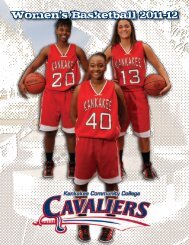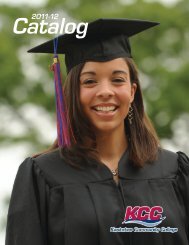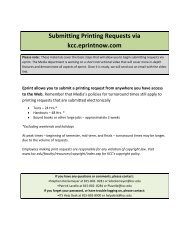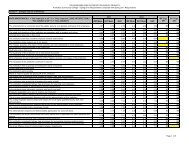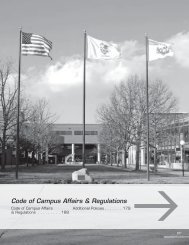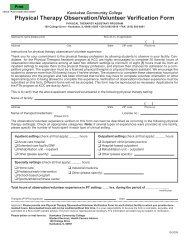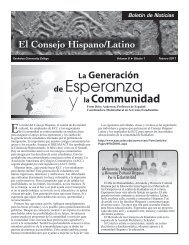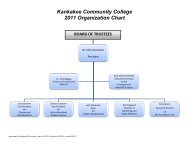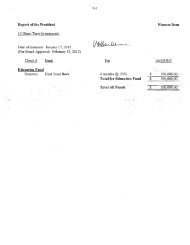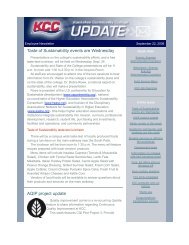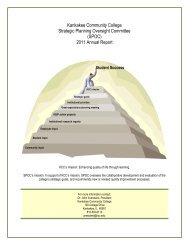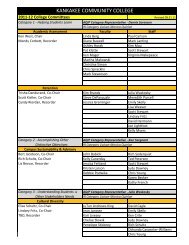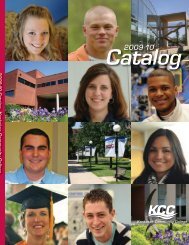Course Descriptions - Kankakee Community College
Course Descriptions - Kankakee Community College
Course Descriptions - Kankakee Community College
You also want an ePaper? Increase the reach of your titles
YUMPU automatically turns print PDFs into web optimized ePapers that Google loves.
ment score; or consent of instructor. Integration techniques,<br />
indeterminate forms, improper integrals, and power series<br />
expansions are the principal topics of the course. Specific topics<br />
include integration (by parts, substitutions, partial fractions,<br />
and inverse circular and hyperbolic functions), L’Hopital’s rule,<br />
convergences tests for infinite series, and Taylor polynomials.<br />
AAS: Mathematics elective. IAI: M1 900-2 Mathematics. IAI:<br />
MTH 902 Mathematics.<br />
MATH 2535 - Calculus & Analytic<br />
Geometry III 5/0 (5)<br />
Prerequisite: MATH 2523 with a grade of C or better. This<br />
course is an introduction to vector calculus and applications of<br />
differentiation and integration to functions of several variables.<br />
Topics include partial derivatives, directional derivatives, motion<br />
in space, line integrals, and multiple integration. AAS:<br />
Mathematics elective. IAI: M1 900-3 Mathematics. IAI: MTH<br />
903 Mathematics.<br />
MATH 2613 - Differential Equations 3/0 (3)<br />
Prerequisite: MATH 2523 with a grade of C or better or equivalent.<br />
Solution techniques for several types of ordinary differential<br />
equations are developed and applied to problems in physics,<br />
geometry, and other sciences. Topics include first-order equations<br />
(separable, homogeneous, exact, and linear), higher-order linear<br />
equations with constant coefficients, the Laplace transform,<br />
systems of linear equations, and power series solutions. AAS:<br />
Mathematics elective. IAI: MTH 912 Mathematics.<br />
Medical Laboratory Technology<br />
Students in the Medical Laboratory Technology program<br />
are advised to consult the Code of Campus Affairs and<br />
Regulations, section 11.4, Page 173. This regulation concerns<br />
completion of all MEDT and BIOL courses in the Medical<br />
Laboratory Technology curriculum with a grade of C or<br />
better.<br />
MEDT 1032 - Medical Laboratory Assistant Skills I 2/0 (2)<br />
Prerequisite: HLTH 1404. This course provides students with<br />
better understanding and knowledge of the health care delivery<br />
systems, medical terminology, infection control, safety, quality<br />
control, test results, central processing, and work skills such as<br />
communication, professionalism, computer, and math skills.<br />
MEDT 1043 - Medical Laboratory Assistant<br />
Skills II 2/2 (3)<br />
Prerequisite: MEDT 1032 or consent of instructor. The course<br />
will provide the student with a basic knowledge and laboratory<br />
skills in the major disciplines of clinical laboratory sciences: urinalysis,<br />
hematology, chemistry, microbiology, and immunology.<br />
Students will be trained to become competent, not only in collection<br />
of specimens (Phlebotomist), but will also be competent in<br />
performing simple or waived tests (CLIA’s reg.) done in hospital<br />
labs, clinics, physicians’ offices, and ambulatory care settings.<br />
MEDT 1114 - Urinalysis & Body Fluids 3/3 (4)<br />
Prerequisites: Admission to the Medical Laboratory Technology<br />
program, or consent of instructor. This course and all<br />
MEDT courses are designed to prepare the student for Clinical<br />
Practicum I and II. Topics covered in this course are an<br />
introductory exposure to the theoretical and technical aspects<br />
of serology, immunohematology, clinical chemistry analysis,<br />
laboratory safety, lab math and laboratory information systems.<br />
Also included is an in-depth coverage of the biochemistry<br />
and analysis involved in the production of urine and body<br />
fluids as they relate to health and disease.<br />
MEDT 1124 - Hematology & Coagulation 3/3 (4)<br />
Prerequisites: Admission to the Medical Laboratory Technology<br />
program and CHEM 1514 or consent of instructor. This<br />
course is designed to prepare the student for Clinical Practicum<br />
I and II. Included are introductions to the following topics:<br />
lab safety, lab instrumentation, and laboratory mathematics.<br />
Theoretical and practical laboratory applications of principles<br />
and techniques in phlebotomy, normal to abnormal hematology,<br />
and coagulation are covered in depth. In addition, the student<br />
receives an orientation to the clinical laboratory through 10<br />
hours phlebotomy experience at the hospital. Students must have<br />
a criminal background check without any disqualifying convictions<br />
and a negative drug screen prior to enrollment.<br />
MEDT 1415 - Physiologic Systems 4/3 (5)<br />
Prerequisites: Admission to the Medical Laboratory Technology<br />
program, or consent of instructor. This is a course in human<br />
physiology and an introduction to medical terminology. Emphasis<br />
is on the physiology of the circulatory, excretory, respiratory,<br />
digestive, endocrine, and nervous systems of the human. The<br />
course will use the regulatory systems approach, emphasizing the<br />
major homeostatic mechanisms of the body and their integration.<br />
Laboratory exercises will be used to illustrate the anatomy and<br />
physiology of the systems under study.<br />
MEDT 2044 - Clinical Microbiology 3/3 (4)<br />
Prerequisite: Admission to the Medical Laboratory Technology<br />
program and BIOL 2714; or consent of instructor. This course is an<br />
in-depth presentation of clinical bacteriology. Topics to be covered include<br />
specimen collection and transport, normal human flora and the<br />
sites associated with it, medias used for culturing and identification<br />
of bacteria from human sources, pathogen susceptibility testing, and<br />
pathology and treatment of human bacterial infections. Also<br />
included is a study of human pathological mycology, the epidemiology<br />
and pathology of fungal infection, the culturing and identification<br />
of pathogenic and normal flora fungi and the treatment<br />
of fungal diseases. In addition, human parasitology including the<br />
epidemiology, pathology, identification from human sources, and<br />
treatment of parasitic infestations will be covered. The student<br />
performs laboratory exercises that simulate hospital procedures<br />
in clinical bacteriology, mycology, and parasitology.<br />
MEDT 2124 - Serology & Blood Banking 3/3 (4)<br />
Prerequisites: MEDT 1114 or consent of instructor. This course<br />
provides an introduction to basic genetics and the nature of the<br />
immune system, with emphasis on the constituents that comprise<br />
serum-mediated immunity. Knowledge of basic laboratory immunologic<br />
principles and procedures are studied. Immunohematology<br />
specifically looks at blood-related antigens and antibiotics<br />
that are encountered in the clinical lab and their relationship to<br />
safe transfusion of blood and its components. Laboratory exercises<br />
include all the commonly performed immunohematology and<br />
serology procedures.<br />
MEDT 2214 - Clinical Chemistry 3/2 (4)<br />
Prerequisites: MEDT 1124 and CHEM 1524; or consent of<br />
instructor. The course encompasses an in-depth study and<br />
understanding of the physiologic and biochemical processes<br />
operant in both health and illness. The student will perform<br />
analyses on various body fluids, grouped according to function of<br />
organ system and will be able to apply and explain the chemical<br />
2010-11 catalog • www.kcc.edu<br />
147



